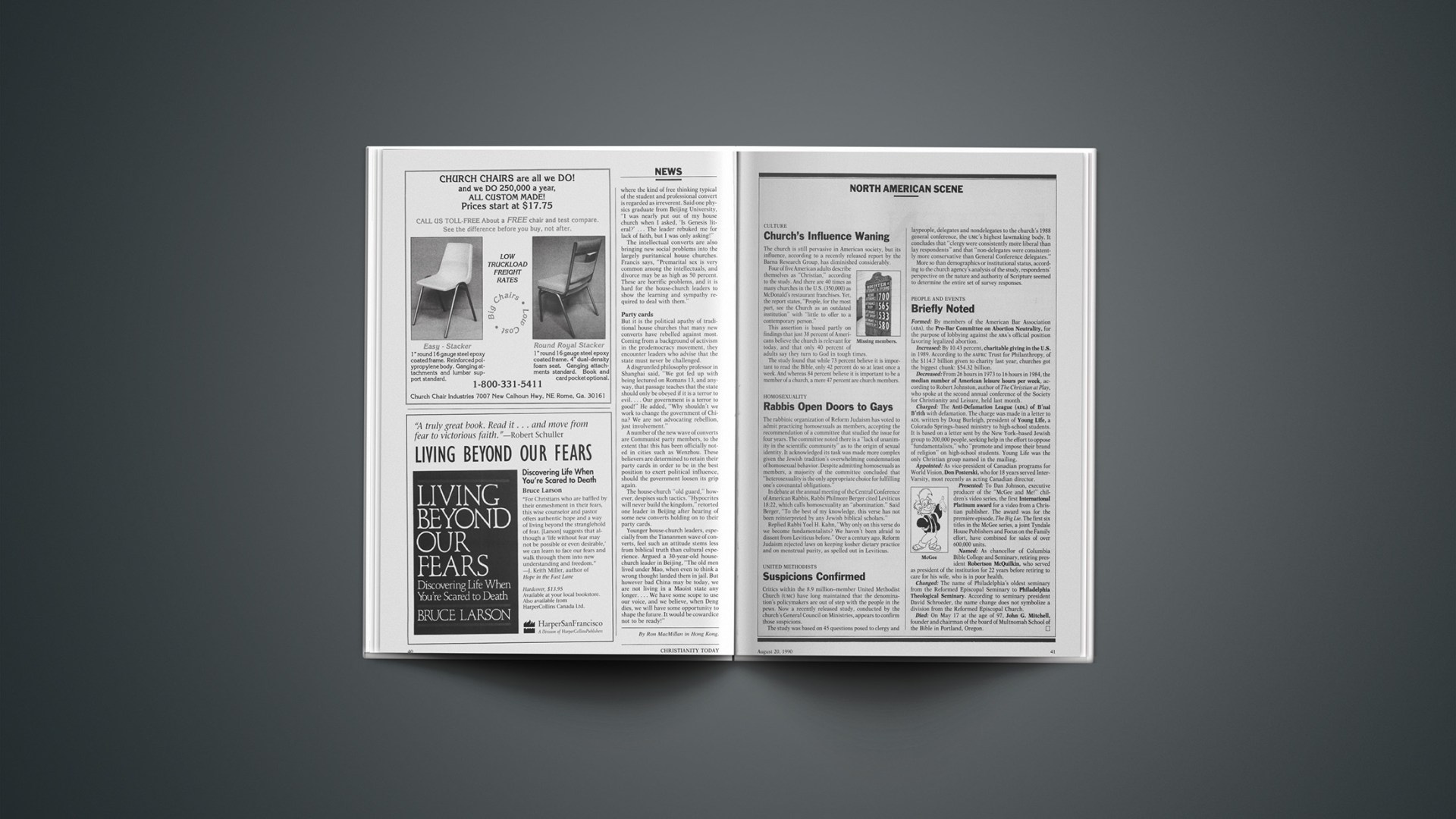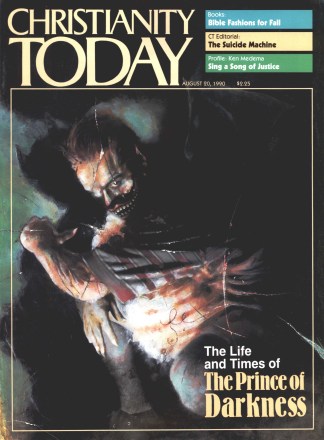CULTURE
Church’S Influence Waning
The church is still pervasive in American society, but its influence, according to a recently released report by the Barna Research Group, has diminished considerably.
Four of five American adults describe themselves as “Christian,” according to the study. And there are 40 times as many churches in the U.S. (350,000) as McDonald’s restaurant franchises. Yet, the report states, “People, for the most part, see the Church as an outdated institution” with “little to offer to a contemporary person.”
This assertion is based partly on findings that just 38 percent of Americans believe the church is relevant for today, and that only 40 percent of adults say they turn to God in tough times.
The study found that while 73 percent believe it is important to read the Bible, only 42 percent do so at least once a week. And whereas 84 percent believe it is important to be a member of a church, a mere 47 percent are church members.
HOMOSEXUALITY
Rabbis Open Doors To Gays
The rabbinic organization of Reform Judaism has voted to admit practicing homosexuals as members, accepting the recommendation of a committee that studied the issue for four years. The committee noted there is a “lack of unanimity in the scientific community” as to the origin of sexual identity. It acknowledged its task was made more complex given the Jewish tradition’s overwhelming condemnation of homosexual behavior. Despite admitting homosexuals as members, a majority of the committee concluded that “heterosexuality is the only appropriate choice for fulfilling one’s covenantal obligations.”
In debate at the annual meeting of the Central Conference of American Rabbis, Rabbi Philmore Berger cited Leviticus 18:22, which calls homosexuality an “abomination.” Said Berger, “To the best of my knowledge, this verse has not been reinterpreted by any Jewish biblical scholars.”
Replied Rabbi Yoel H. Kahn, “Why only on this verse do we become fundamentalists? We haven’t been afraid to dissent from Leviticus before.” Over a century ago, Reform Judaism rejected laws on keeping kosher dietary practice and on menstrual purity, as spelled out in Leviticus.
UNITED METHODISTS
Suspicions Confirmed
Critics within the 8.9 million-member United Methodist Church (UMC) have long maintained that the denomination’s policymakers are out of step with the people in the pews. Now a recently released study, conducted by the church’s General Council on Ministries, appears to confirm those suspicions.
The study was based on 45 questions posed to clergy and laypeople, delegates and nondelegates to the church’s 1988 general conference, the UMC’s highest lawmaking body. It concludes that “clergy were consistently more liberal than lay respondents” and that “non-delegates were consistently more conservative than General Conference delegates.”
More so than demographics or institutional status, according to the church agency’s analysis of the study, respondents’ perspective on the nature and authority of Scripture seemed to determine the entire set of survey responses.
PEOPLE AND EVENTS
Briefly Noted
Formed: By members of the American Bar Association (ABA), the Pro-Bar Committee on Abortion Neutrality, for the purpose of lobbying against the ABA’s official position favoring legalized abortion.
Increased: By 10.43 percent, charitable giving in the U.S. in 1989. According to the AAFRC Trust for Philanthropy, of the $114.7 billion given to charity last year, churches got the biggest chunk: $54.32 billion.
Decreased: From 26 hours in 1973 to 16 hours in 1984, the median number of American leisure hours per week, according to Robert Johnston, author of The Christian at Play, who spoke at the second annual conference of the Society for Christianity and Leisure, held last month.
Charged: The Anti-Defamation League (ADL) of B’nai B’rith with defamation. The charge was made in a letter to ADL written by Doug Burleigh, president of Young Life, a Colorado Springs-based ministry to high-school students. It is based on a letter sent by the New York-based Jewish group to 200,000 people, seeking help in the effort to oppose “fundamentalists,” who “promote and impose their brand of religion” on high-school students. Young Life was the only Christian group named in the mailing.
Appointed: As vice-president of Canadian programs for World Vision, Don Posterski, who for 18 years served InterVarsity, most recently as acting Canadian director.
Presented: To Dan Johnson, executive producer of the “McGee and Me!” children’s video series, the first International Platinum award for a video from a Christian publisher. The award was for the première episode, The Big Lie. The first six titles in the McGee series, a joint Tyndale House Publishers and Focus on the Family effort, have combined for sales of over 600,000 units.
Named: As chancellor of Columbia Bible College and Seminary, retiring president Robertson McQuilkin, who served as president of the institution for 22 years before retiring to care for his wife, who is in poor health.
Changed: The name of Philadelphia’s oldest seminary from the Reformed Episcopal Seminary to Philadelphia Theological Seminary. According to seminary president David Schroeder, the name change does not symbolize a division from the Reformed Episcopal Church.
Died: On May 17 at the age of 97, John G. Mitchell, founder and chairman of the board of Multnomah School of the Bible in Portland, Oregon.










